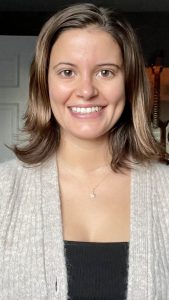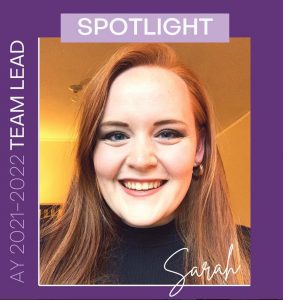
When I was nine years old, I immigrated to the United States from Bulgaria, not knowing how to speak English at the time. I felt like I was always trying to prove myself in school, and I had to work harder than my peers because English was not my native language. Getting into college was a big achievement for me, because I felt like one of the primary reasons my family moved to the US was so that I could have the opportunity to pursue higher education, a path that was not common or easily achievable in Bulgaria.
When I first got to undergrad, I realized that my high school classes had not prepared me for the type of writing assignments I had in college. I was placed in an introductory college writing class where I would receive more writing support. I tried to focus on myself and not compare myself to other students who were taking advanced writing classes during their freshman year.
I think starting out more slowly really helped me improve my writing. I was also thankful that my writing professor encouraged us to use the on-campus writing center. I admit, at first, I was reluctant to reach out and ask for help. But, once I committed to making that first appointment, I realized the writing center tutors were one of the most useful resources on campus. Although I ended up majoring in neuroscience, I also took advantage of the variety of classes the liberal arts had to offer. I could find a writing tutor for whatever my writing needs were, no matter whether I needed help with my lab report for biology or my personal ethnography for sociology. My liberal arts undergraduate education exposed me to many writing styles and helped me develop more holistic skills that I could apply across disciplines.
Being able to be concise while also developing a narrative that flows is the key to good writing regardless of the style (creative, academic, autobiographical, etc.). That is what the writing center tutors helped me achieve over time. By my junior year, I was tutoring at the writing center and helping other students build their confidence and skills.
I am a dual degree student at the BU School of Public Health and the School of Social Work. I earned my MSW in May 2021. Now I am pursuing a functional certificate in CAPDIE and a context certificate in Human Rights & Social Justice. I have previous clinical experience which has allowed me to adopt a client-centered, trauma-informed, and strengths-based approach to public health issues. I am excited to combine these two degrees as I work to address health and mental health disparities.
I also bring a student-centered, strengths-based approach to my work as a peer writing coach. I enjoy getting to know the students I work with, and I look forward to learning from them. I see coaching/tutoring as a two-way relationship and a space where two public health professionals can have meaningful discussions. I encourage you to give us a try!

